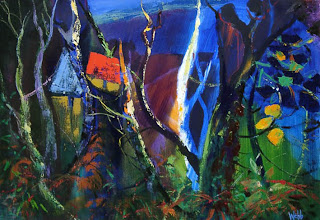'Regard all dharmas as dreams'.
This is the first slogan of the second section of the 'Seven Points of Mind Training'. It's the first of the slogans which emphasise the ultimate quality of Bodhicitta - that of Emptiness. I've been bringing this to mind the last few days.
I remember many years ago, when first practising Dharma I used to wonder about this phrase or teaching. I used to try to see things in this light, but to a degree, it felt like mind games. Experience was so vivid, so clear, and yet, I was being told it was like a dream. I took this to mean that it wasn't as real as I thought it was .... that somehow it was 'made up', that it was hazy and unclear, and that I would somehow 'wake up' from it. What would I wake up into? Well, somehow I imagined something entirely unlike 'this', whatever 'this' was that I was experiencing. Somehow it was going to be shiny and light, transcendent .... an entirely different plane of existence altogether!
Well, it always felt a little fraudulent, trying to take on that view, as I didn't truly experience it ... just hoped I would, or try to reach towards it, trying to find hints of it in my experience. And find them I did .... little hints or glimpses of what it might mean, this dreamlike state of existence that I was trying to wake up from.
Many years have passed, and much of my yearning for the dramatic and different has passed. Grand ideas of what this 'transcendence' was have given way to the gentle opening of experience, and something other than just ideas.
Though I have no realisation whatsoever, I sense growing experience of the things the teachings point at. And that gives great comfort and hope, that all this is not in vain, that the path can be walked, and that even a simple being with much difficult karma such as myself can open the heart and mind to the teachings.
All dharmas are dreams .... all phenomena are dreams.
What do we know?
We go around in the world, thinking we know things ..... we see something, and we label it in our minds, and 'know' it. We see shapes and maybe smells .. and we label it 'dog'. And we think we know that.
But where is the dog?
Where is this thing that we think we know?

In my experience there arises shapes and sounds, and colours and smells. From that .... I jump to something else. Dog.
And then I do all manner of things on the basis of my knowing 'dog'. I remember things about dogs. I act in ways that are patterns in relation to dogs. And I treat this that arises in experience on the basis of my thoughts, views, ideas and emotions in relation to dog. Yet where is the direct experiences in my sensory consciousness's? They seem to get lost and left behind in the rush to concept ... in the grasping after 'dog' and acting on the basis of 'dog'.
Same thing with my partner and kids .... same thing with work .... same thing with meditation ...same thing all round .... I experience sensory arisings ... and then I grasp after concepts to make sense of them. And then I pay a lot of attention to the concept and very little to the direct sensory experience.
So what? Well, the sensory experiences are very direct. They seem to arise in my experience directly. They are vivid and alive. What of the ideas that I impute on them? They are secondary phenomena which have not real existence in and of themselves ... only in my monkey mind, in my mind consciousness. And they could clearly be easily swapped for other ideas which would equally well describe and make sense of my sensory experience. So they are relative .... chosen on the basis of bias from my past experience and exposure ... and entirely fictional. They fit the sense data more or less .... but so would so many other concepts. And those other concepts would lead to different experiences, and different responses to the sensory data.
In a sense, those sense impressions are real. They appear to arise for me in my experience. There is an arising of a shape. They is no mind separate from that shape, and there is no shape separate from that mind that knows it.
In comparison, the concepts that I then automatically make up to make sense of those impressions .... are they real? They are like a dream. They are just imputed. They are 'made up'. They are interpretations ... which only make sense to me, if at all. No-one else, just me, at that moment, with my experience and history.
At least you could say that I have the sense of darkness. Of movement, of smells shifting. Of sound, loud or soft. In a sense.
Yet the concept dog .. that thing that I actually pay attention to, and swap with my direct experience .... that is a mirage, and a dream.
To the realised master ... why do they delight so in the simple things in life ... in the simple things in nature ... in the simple act of eating, or seeing a flower, or just walking? Why do they have a childs delight in those things? Is it because (in part) that they don't get lost in the concept .... the concept which includes the notion that we've seen it all before ... we know this thing, we know this concept .. and therefore are barely alive to what we experience, as it passes us by, as we rush to the next high, the next experience?
Delighting in the immediate .. delighting in experience, direct and simple .... what a joy that is :-)
And how different that is from being lost in our concepts ... our understanding .. our explanation of what we experience.
All phenomena are dreams.
When we look deeply, we see that these 'understandings' of things that we have .. these concepts and ideas with which we make sense of things ..... they are dreamlike and illusory, in comparison with the sense impressions we have .... and the emotions which arise on them. Yet we spend our lives grasping after them, and acting on them ... as the sense impressions slip away, forgotten and un-noticed.
Utterly habitual, and beyond the normal person's control. Only though the process of sustained awareness, of cultivating awareness, and seeing through our experience for what it is .... do we see that we've swapped the vividness and aliveness of what is ... our sense impressions and simple emotions .... and grasped after our complex ideas with all their 'castles built on sand' quality.
and yet .. and yet .... looking deeper still at these sense impressions .... where are they?
For sure they seem to arise ... in experience .. and vivid too.
Can we doubt that they seem to arise .. so fresh and alive they are to our minds?
And yet .. and yet .... where are they ... as we search for them ... how do we touch them in our minds ..... to grasp them .. or hold them .. .they just slip away too as dreams. Looking deeply, all sense impressions just slip away through our fingers. The act of looking dissolves them into mist.
Where are these direct sense impressions then, that we'd swapped for illusory concepts?
Like mirages too .... like dreams and illusions ... these impressions slip away before the light of awareness.
And yet ... they seem to arise.
Seeming to arise in experience, yet not to be found.
Seeing one ... we see the other ... inseparable. Seeming arising ..... and emptiness.
Seeming experience, yet lack of any solidity to it.
All phenomena are like dreams.
Concepts, sense impressions all .... untouchable, ungraspable, open and cannot-be-pinned-down-ness ......
yet seemingly there in extraordinary vividness and clarity.
The more I let go of concepts, the more vivid and clear experience becomes. And the more transparent too.
Vivid and Transparent .....
Dreamlike.
Luminous Emptiness.
 My predominant poison at present is hatred. (It's the desire to push things away, to reject aspects of experience and seek to move away from them).
My predominant poison at present is hatred. (It's the desire to push things away, to reject aspects of experience and seek to move away from them).











